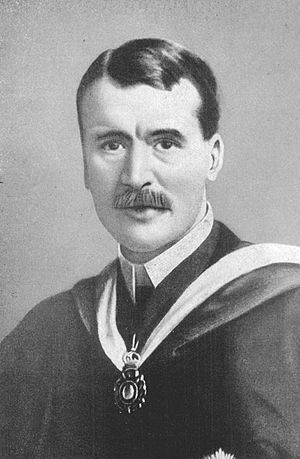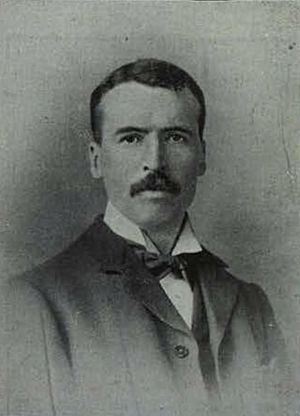Thomas Henry Holland facts for kids
Quick facts for kids
Thomas Henry Holland
|
|
|---|---|
 |
|
| Born | 22 November 1868 Helston, Cornwall, England
|
| Died | 15 May 1947 (aged 78) |
| Alma mater |
|
| Occupation | Geologist, university administrator |
Sir Thomas Henry Holland (born November 22, 1868 – died May 15, 1947) was a very important British geologist. He spent many years working in India with the Geological Survey of India. He even became its director, which means he was in charge, from 1903 to 1910. After his time in India, he worked as a leader at Edinburgh University in Scotland.
Contents
Early Life and Learning
Thomas Holland was born on November 22, 1868, in a town called Helston in Cornwall, England. His parents were John Holland and Grace Treloar Roberts. Later, his parents moved to Canada to live on a farm.
When he was 16, in 1884, Thomas won a special scholarship. This allowed him to study at the Royal College of Science. He was a brilliant student and earned a top degree in Geology. A famous teacher there, Thomas Henry Huxley, really inspired him. Thomas Holland then worked as an assistant to another professor, John Wesley Judd. In 1889, he received a special award called the Berkeley Fellowship to study at Owens College in Manchester.
His Work as a Geologist
In 1890, Thomas Holland moved to India. He became an Assistant Superintendent for the Geological Survey of India. This group studies the Earth's rocks and minerals in India. He also became the person in charge of the Geological Museum and Laboratory.
By 1903, he was promoted to Director of the Geological Survey of India. This was a very important job! The next year, in 1904, he was chosen to be a Fellow of the Royal Society. This is a big honor for scientists in Britain.
One of his most famous achievements was describing a new type of rock. He named it charnockite. He found this rock on the tombstone of a person named Job Charnock in Kolkata. The rock had been brought from Chennai. Holland also studied other rocks in southern India. He helped to classify them into different types, including the charnockites.
For all his hard work in India, he received a special award in 1908. He was made a Knight Commander of the Order of the Indian Empire. This meant he was given the title "Sir."
Later Career and Awards
Sir Thomas Holland returned to Britain in 1910. In 1912, he joined a special group called the Royal Commission on Fuel and Engines. He also led the British Science Association from 1928 to 1929.
He helped publish a four-book series called "Provincial Geographies of India" between 1913 and 1923. These books described the different regions of India.
Sir Thomas Holland became the leader, or Rector, of Imperial College London from 1922 to 1929. Then, he became the Principal of the University of Edinburgh from 1929 to 1944.
In 1939, he received another important award, the Albert Medal. He earned it for his great contributions to the mining and mineral industries. He was also a member of the Royal Cornwall Polytechnic Society.
From 1929 until 1940, he was the Principal of Edinburgh University. In 1930, he became a Fellow of the Royal Society of Edinburgh. He also served as the Vice-President of this society. He was the President of the Geographical Association from 1937 to 1938. In 1941, he won the Society's Bruce Preller Prize.
Personal Life and Death
Sir Thomas Holland passed away suddenly at his home in Surbiton on May 15, 1947.
He was married twice. First, in 1896, he married Frances Maud Chapman, who died in 1942. Then, in 1946, when he was 78 years old, he married Helen Ethleen Verrall.
 | Emma Amos |
 | Edward Mitchell Bannister |
 | Larry D. Alexander |
 | Ernie Barnes |


